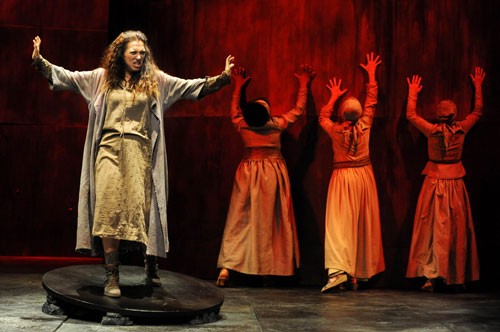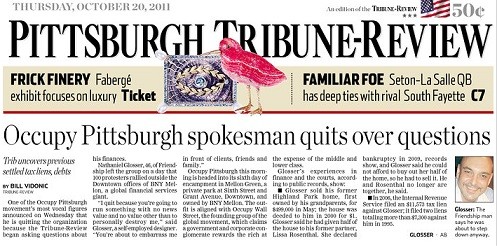Monday, October 31, 2011
Boooo! Spooky! Hey! Halloween!
Let's cut right to the MP3. This week it comes from a guy, Phil Boyd, who used to sometimes dress up as a giant squid when he performed. That's almost topical, right? His current solo project is Hidden Twin, and his latest EP (on Machine Age Records) sounds more like the squid thing than the first couple of Hidden Twin records. Still with me? Phil's also the voice of Modey Lemon, and TMEye.
The track we're offering up for your downloading pleasure? "Endangered Birds."
PS: If you Google hidden twin, the first result you get is titled: "Twin Pregnancy FAQ - Can There Be a Hidden Twin?"
*Download link expired*
A group of four Irish poets made City Of Asylum/Pittsburgh's big white tent on Sampsonia Way one of three stops on their U.S. tour.
Rita Ann Higgins, Eiléan Ní Chuilleanáin, Caitríona O'Reilly and Leontia Flynn were all included in the new anthology The Wake Forest Book of Irish Women's Poetry. The other two stops were at Chicago's prestigious Poetry Foundation and New York's famed 92nd Street Y.
About 120 people attended the free reading here this past Friday.
Higgins was a hit with her droll, sometimes salty work. One darkly comic poem consisted of remembered lines of conversation spoken by a family friend from her childhood, a woman who criticized even her newly deceased husband: "That's the type of person he was. He'd rather die than please you."
Chuilleanáin's wonderfully lyrical work included selections from her 2010 book The Sun-fish, about the basking sharks that live off Ireland's west coast. She memorably described the big animals "feeding through their fixed yawn."
O'Reilly offered work including a poem written from the perspective of a geisha, with evocative imagery like "the new moon's incised smile."
And Flynn featured poems about classic authors, adroitly suggesting their personas. The F. Scott Fitzgerald piece had a nicely elegaic tone: "What we were straining for, it was already lost."
Given the anthology they were touring behind, an implicit theme of the reading was "women poets." But as the poets themselves agreed, that theme is a bit dated. The eldest, Chuilleanáin (b. 1942), said that when she was starting her career, in the early '60s, women poets were all but unheard of. (She said that at readings, she was sometimes taken for "a male impersonator.") But O'Reilly and Flynn, both under 40, hadn't experienced any such prejudice.
There was also some discussion about the use of Gaelic -- or, as the Irish call it, "Irish." While the language is still taught in schools, it's not widely spoken. Some poets just enjoy its sound, though. Higgins read one complete short poem in Irish, then its English translation.
An hour later, during the Q&A, a man in back asked Higgins why she'd bothered to write the poem in Irish if she were only going to have to translate it anyway. Well, Higgins replied with tart good humor, if she hadn't done so, "There'd be a guy at the back of the room asking, ‘Why didn't you fooking translate it into English?'"
Tags: Program Notes
Thursday, October 27, 2011
We're not sure why anyone would want to get into the middle of the donnybrook for Allegheny County Executive, but anti-fracking activist Dana Dolney is doing exactly that.
Dolney made a splash during the May Primary when she launched a write-in campaign on an anti-fracking platform just 24 hours before Fitzgerald tangled with Democratic challenger Mark Patrick Flaherty.
Dolney and other anti-drilling activists were worried that there were no real differences between the candidates when it came to Marcellus Shale drilling so they decided to mount the write-in campaign.
The campaign was run mainly on social media, and in less than a day Dolney managed to garner nearly 500 votes. And although she could do better with two weeks to campaign, Dolney say her candidacy is not about numbers.
"For us this is not about a number, this is about the message," Dolney told City Paper. "This is about the future and what type of candidates both parties will choose to endorse.
"The public will not be limited to an R and a D if neither candidate can stand for what is best for the people."
The campaign, she says belongs to the people and "will not have yard signs, mud-slinging commercials, or campaign contributions."
CP's coverage of the county executive race was one of the reasons Dolney decided to run, according to her campaign press release.
In that story GOP political consultant Bill Green said, "There are no issues in this campaign...They both want to drill [for natural gas] and while they differ on methods, both want to clean up the Port Authority ... what it comes down to is a battle of personalities."
"This is unacceptable for we, the people of Allegheny County," Dolney says. "Which is why I am asking for your vote.
"I will do better for the people of our county. You are my priority, not the gas drillers with their lavish campaign contributions."
Both Fitzgerald and Raja have said they intend to drill for natural gas in the Marcellus Shale on county-owned land like parks and Pittsburgh International Airport.
"I pledge to work diligently to protect our county's parks from the destruction caused by shale gas drilling," Dolney said in her statement. "Together we will protect our air and water from the onslaught of carcinogens, toxins, and pollution with which this industry has already burdened other communities throughout our region."
Dolney says a campaign Facebook page will be up and running soon and the campaign will be sponsoring a voter's challenge. Residents will be asked to commit to voting in the upcoming election and get five additional people to make the same commitment.
"Right now, in this moment, we can pull together and stand for what is right, getting our message heard throughout Allegheny County," says Dolney. "Many young adults may sit this election out, which is a tragedy because their future is at stake."
Tags: Slag Heap
Wednesday, October 26, 2011
Republican Allegheny County Chief Executive candidate D. Raja rolled out the plan for his first 100 days in office Wednesday afternoon. And while most of the press event went according to the plan, Raja also found himself dogged by questions regarding 84 lawsuits he filed against employees between 1996 and 2009.
Raja said that if elected, he would quickly implement benchmarks to measure performance, and take on issues facing the county including property assessments, the Port Authority and Marcellus Shale drilling.
For example, Raja said he would list what the unemployment rate is when he takes office, and then set a goal for where that number should be after a set period of time. A plan will then be developed and executed to try and reach that goal.
And because the goal has been clearly stated, the public will know how his administration has performed. Raja said even great ideas can fail because of bad execution but, "average ideas can become great because of great execution.
Of note in Raja's plan is the inclusion of a "focus to eliminate disparity ... to ensure that all residents are successful. In particular, the objective is to see significant progress in the African American community." One of his plans is to start creating minority business districts within his first year in office.
Raja said the fact that this region's African American community is the poorest in the country is "appalling" and says he will take steps to improve conditions. The entire plan can be found here.
After introducing his plan, Raja was once again by reporters asked about his decision to file lawsuits against 84 former employees, as first reported in City Paper a week ago. The campaign of his opponent, Democrat Rich Fitzgerald, also released a press release shortly before the press event questioning Raja over the suits.
Mike Mikus, Fitzgerald's campaign manager called the event "staged ... in an effort by his campaign to deflect attention from his lawsuits against his own employees."
"Raja needs to stop with the gimmicks and explain why a man of his wealth feels the need to sue 84 of his own workers."
The events are nothing new for Raja: He has been holding policy roll-outs every 10 days to two weeks for the past few weeks. But in response to the accusations, Raja said the lawsuits were being used as distracting tactics from Fitzgerald.
"People have been asking me why don't I address these lawsuits," Raja said. "But this is exactly what Rich Fitzgerald wants me to do." He says Fitzgerald wants Raja talking about the lawsuits because "he doesn't want me talking about the issues."
Raja says that the number of lawsuits has to be put in the context of the "thousands" of people who've worked at his company over the years. "Ninety-nine percent of our consultants have had no issues."
Tags: Slag Heap
It's not that I think people have changed that much. But what interests me about the art of antiquity is whether it's possible to relate to, or even fully comprehend, pictures and stories created in societies so different from our own.
Sophocles wrote this play about 410 BCE -- roughly contemporaneous with the construction of the Parthenon -- and the dialogue references myths, tales and historical figures centuries older still. The play's 2,400-year-old characters inhabit a cosmos of multiple and quite fickle living deities, one where fate depends partly on making appropriate offerings to the dead.
Indeed, theater itself even had a different purpose, more religious ritual than vehicle for personal expression.
Still, in Electra you can see theater as we understand it take shape. That's largely because Sophocles' Greece was more or less society as we understand it. Back then, no ship had yet crossed an open ocean, and telecommunication seemed less likely than telekinesis. Nonetheless, the royal palace of Mycenae is a setting where wealth, power, fame and privilege exist -- in ways they hadn't before the rise of civilization -- and sit at odds with justice.
At moments, the story resonates with current events.
In this staging, directed by the Public's Ted Pappas, Electra (intensely portrayed by Catherine Eaton) enters crawling; she's spent 20 years mourning her father, the king. He was slain by Electra's mother and her mother's scheming lover, now queen and king. Yet Electra is not driven by pure grief: Daily she must live with the flesh-and-blood reminders of the wicked deed. She wants justice, but isn't capable of claiming it herself.
Especially pointed is the relationship between Electra and her sister, Chrysothemis. Chrysothemis, dressed in flowing finery to Electra's rags, isn't any happier about their father's murder than is Electra. But she's accommodated herself to it. As Chrysothemis points out, it's simply easier to take the side of the powerful. "They are on the rise and we are sinking," she tells Electra. "Learn to give in."
Afterall, bending to power gets you nice things. And you can sleep inside, rather than outside, the castle walls.
Chrysothemis reminds me of the two suit-wearing young men walking to their office jobs Downtown this morning whom I overheard mocking the Occupy Pittsburgh protestors camped on Mellon Green.
Protest? Why bother? It's so much easier to just buy stuff.
Electra sees protest as her job. She's even under threat of exile and imprisonment.
Here, for sure, the analogy breaks down: Electra is royalty, after all, and desires not better government per se, but only the restoration of a rightful monarch. (She could, unlike most of us, be in the 1 percent, if she liked.)
Meanwhile, justice in Electra wants only the assassination of a couple of malefactors, as Electra's long-lost brother, Orestes, intends.
Compared to creating a more equitable global economy, that's kind of a snap.
Electra has seven more performances tonight through Sun., Oct. 30, at Pittsburgh Public Theater (www.ppt.org).
Tags: Program Notes , Image
Tuesday, October 25, 2011
The last time I was inside Polish Hill's old Emma Kaufmann Clinic, about two years ago, it was because some activists had turned the now-vacant building into a makeshift free clinic for G-20 protesters.
The building has a much different feel hosting Quantum artistic director Karla Boos' adaption of the Graham Greene novel. And most of the wounds in the play, emotional rather than physical though they be, go untended.
From the first, we know (or at least sense) that the affair between the writer Bendrix and married Sarah Miles will end sadly. What's haunting about the play is not that the characters won't do what would make everyone happiest; it's that they can't.
Bendrix (played by Tony Bingham) is too impassioned -- the man who would rather die than face the moment of parting after one of the couple's assignations. What drives Sarah (Gayle Pazerski) is harder to pin down.
"One can't love and do nothing," she tells Bendrix, explaining their affair. But she won't leave her gray, mid-level-bureaucrat husband (one of several roles expertly assayed by James FitzGerald). And it's never clear whether it's because of propriety, because she thinks it's wrong, because it would hurt him too much -- or because of God, the play's large, invisible character.
Come down to it, this anguished play's biggest conundrum is arguably the existence and function of that higher power. Both Bendrix and Sarah profess not to believe in God -- but the idea of God shadows their every move.
Sarah even uses that idea as an analogy to explain how the lovers can be apart. "People can love without seeing each other," she tells Bendrix. "People go on loving God, don't they, all their lives, without seeing him."
The script has a certain transparency that might be mistaken for oversimplication. These characters are, throughout, as naked emotionally as they occassionally are physically. That transparency is the quality of a vitrine that simply contains a greater mystery.
The show is acted with craft and commitment (that's Bingham and Pazerski, pictured) and directed by Martin Giles on a striking set by Tony Ferrieri.
Quantum (www.quantumtheatre.com) stages The End of the Affair through Sun., Oct. 30.
Tags: Program Notes , Image
Monday, October 24, 2011
The legendary(?) Pittsburgh country band The Four Roses is releasing a new album ... and breaking up. Don't worry; the break-up is built into the release: It's titled Goodbye! We're The Four Roses. Fortunately for us, out ahead of their last show on Saturday, the 29th, at Hambone's, they've offered us the cranky and tongue-in-cheek (aren't all of their songs?) "Another Song 'Bout Texas."
*Download link has expired*
After interviewing Bell for last week's CP (http://www.pittsburghcitypaper.ws/gyrobase/Content?oid=oid%3A101939), I wanted to check out the San Francisco-based comic for myself, especially at this curious Downtown venue.
The bar-restaurant in an historic Boulevard of the Allies building isn't known as a performance spot. Indeed, when you walk through the front door, you're simultaneously entering the bar and skirting the edge of the "stage" area: a little clearing with a mike stand hemmed in by the bar on one side and on two others by 20 repurposed chairs from the dining room.
But it was a felicitous venue for Bell. Maybe 80 people packed the space (not uncomfortably), and most were well in tune with his smart, occasionally uproarious riffs on race, racial politics and pop culture in America.
Bell's made his name largely at performance festivals, including Scotland's famed Edinburgh Fringe Festival. He effectively combines a friendly, even slightly goofy stage presence with a race-in-your-face approach: He started his set by counting out loud the black faces (there were five, I think) in the overwhelmingly white crowd.
In Bell's take, Herman Cain is a man who's paid his way into a "presidential-campaign fantasy camp": The worst thing that could happen for him is he wins the election, then learns he can't really hit the fastball.
Bell offered two ways to get the economy moving and the country solvent again. The first way is to legalize pot, then tax not only weed itself but also snack foods, shiny things and other impulse purchases: "Hey, look at this DVD! I didn't know Steven Segal made a musical! Put all that food back." The second way is to cut labor costs by reintroducing slavery -- though Bell noted that he should be exempt because it was his idea.
The show opened with a nice set by locally based comic Ron Placone, a friend of Bell's who booked him at Papa J's when he learned Bell was coming to the area for a college show in the region.
Tags: Program Notes , Image
Saturday, October 22, 2011
With two (really, three) notable guests, some gorgeous music and $20 tickets, the BNY Mellon Grand Classics "Rising Stars in Debut" show makes for as good a weekend as any to check out the PSO.
I saw it last night.
The rising stars include the award-winning, Mongolian-born young violinist Xiang Yu. Xiang, now studying in Boston, won first prize last year in the prestigious Yehudi Menuhin International Violin Competition; this weekend, he's the internationally celebrated soloist for the PSO's rendition of Prokofiev's Concerto No. 2 in G minor for violin.
It's a stunning 26-minute work; the Heinz Hall crowd liked Xiang's performance enough to demand an encore, for which he performed (solo) Bach's Adagio in G minor. He said it had been, in his childhood, the first piece he'd ever played on violin.
The PSO program opened, however, with "Radical Light," a 2007 work by the orchestra's current composer of the year, Steven Stucky. Stucky himself came on stage to briefly introduce the piece, which he called a "tone poem." The principal tone was a shimmering one, toward the high end of the violins but short of piercing, and true to the work's title evoking the spiritual air of daybreak.
The evening closed with Robert Schumann's Symphony No. 4 in D minor, Opus 120. It's a work alternately lush and exuberant (even somewhat chesty). As with the rest of the program, the orchestra was led by guest conductor Xian Zhang (the other "rising star" making her PSO debut). The Chinese-born Xian is a compact, animated figure, the soles of whose feet frequently leave the podium entirely. She's as much fun to watch as any conductor I've seen.
The bonus this weekend is that the PSO is offering a limited number of $20 tickets, available in all seating sections, for a savings of up to $73 a ticket. Call 412-392-4900 or see www.pittsburghsymphony.org, and keep handy the promo code 28164.
There's one more performance of this program, at 2:30 p.m. Sun., Oct. 23.
Tags: Program Notes
Thursday, October 20, 2011
In all the coverage of Occupy Pittsburgh, you may have seen a handful of protesters wearing funny masks, or scarves over their faces. And you've probably wondered, "If they aren't criminals, why do they hide their identity?"
Well, I give you Exhibit A, courtesy of our own Tribune-Review. Where today we learned the following:
One of the Occupy Pittsburgh movement's most vocal figures announced on Wednesday that he is quitting the organization because the Tribune-Review began asking questions about his finances.
Nathaniel Glosser, 46, of Friendship left the group on a day 100 protesters rallied outside the Downtown offices of BNY Mellon, a global financial services giant.
Oh, man. This is gonna be good. It has to be, right? After all, the Trib put this story on its front page.
I mean, come on: They gave it top billing over the story about exotic animals escaping from an Ohio farm. One of those animals is an escaped monkey carrying the herpes virus. And I can tell you: When the Trib gets hold of a diseased monkey, it doesn't let go. In fact, it often hires that monkey to write its editorials.
Haha! I kid the Tribune-Review!
Because sure enough, it turns out that Glosser, this perfidious charlatan, this public menace, this shiny-pated Mephistopheles who smiles out at us*, is the type of guy who ... racks up a bunch of overdue bills. And then pays them.
Oh, it's true. Tribune-Review reporter Bill Vidonic gives us the details:
- Over the past 15 years, Glosser has been hit with federal income-tax liens totaling just under $20,000. He's since paid them.
- In the past eight years, Glosser racked up $8,000 in local tax liens to the county, school district, and city. Those liens have also been paid.
- Last year, Glosser had a dispute with a landlord, who was seeking $3,700 in back rent and legal costs. Glosser paid that bill several months ago.
- Glosser once ran up a bill with a credit-card company. He paid that $4,500 bill more than five years ago.
- Also, Glosser inherited a Highland Park home from his family, which he sold earlier this year for just under a half-million dollars.
Given a chance to comment, Glosser cited some "very personal issues" he didn't want to discuss. He also surmised that "you're going to run something with no news value and no value other than to personally destroy me."
I want to thank the Trib for bringing this to my attention. Should I ever encounter Glosser socially, I will insist that he buy the first round. A valuable public service has been performed.
Or has it? It's not like Glosser is running for county treasurer. The story itself can't seem to cite a reason why any of this matters. About as close as it gets is this: "Glosser emerged as the main person fielding media calls ... and his name appeared on the permit with Pittsburgh police allowing last Saturday's march and rally."
So I guess the lesson here is: If you want to have a march decrying economic hardship, make sure that the person applying for the permit has a good credit score.*
As for the rest, yes, the Trib itself quoted Glosser multiple times in the days prior to Vidonic's big expose. On each occasion, Glosser spoke -- quite accurately -- about the movement's tactics and plans. He didn't offer his own critiques of capitalism or the wealthy.
But no matter: Having relied on Glosser so much for information, the Trib could justify its story at least partly on the grounds that he was so vocal. If Glosser didn't want the Trib poking into his private affairs, he shouldn't have answered its phone calls. Based on some conversations I had over on Mellon Green this afternoon, I've got a feeling you won't see Occupiers making that mistake again.
I should say here that Vidonic himself has a good reputation as a reporter and human being, and much of the rest of his reporting on the Occupy movement has been quite good. And in any case, it wasn't Vidonic who put this thing on page 1.
But if you're looking for reasons to deride the Occupy movement -- as publisher Richard Mellon Scaife's coterie of editors no doubt is-- the story will no doubt have you licking your lips. "The guy owned a half-million-dollar house! He must be one of those trust-fund lefties you hear about! And while these Occupiers complain that the rich don't pay their fair share of taxes, he let his own taxes be overdue! It's liberal hypocrisy!"
And yes, it certainly makes a great right-wing talking point. (Glosser himself clearly understood the danger: On Tuesday night, Glosser sent fellow Occupy organizers a message "disassociating" himself from the group "due to the possibility of negative publicity and perception about me.")
But that just raises the question: Why is a daily newspaper devoting its front page to right-wing talking points? The front page ought to be devoted to the important stuff -- like wars, the economy, and the strange death of Vince Foster. What's happened to news judgment in the House of Scaife?
Well, I think it's pretty clear: We're seeing a daily newspaper using its resources to bully people around, embarrassing them with personal information the paper can't even claim any public interest in -- simply for availing themselves of their First Amendment freedoms. Not the noblest use of a printing press I've ever seen.
It probably goes without saying that right-wing figures don't have to worry about the same degree of scrutiny from the Trib. Folks who join the Tea Party movement, for example, can count on the Trib not asking too many questions.
Consider the case of Dale "Dale the Electrician" McCoy, a Beaver County fixture on the local Tea Party circuit. McCoy purports to have been a Democrat and a union member at one time, and his role at Tea Party rallies has been to make people feel OK about hating unions. McCoy has appeared in the Trib plenty of times, but without attracting any apparent scrutiny.
Check out this story -- written by Vidonic himself -- that mentions an appearance by McCoy this past April:
Rally speaker Dale McCoy, 49, of Hopewell, Beaver County, an electrical foreman with a local company that he declined to name, said he does not have a problem with individual union members, but many members don't believe they are represented well by their leadership.
Wait a minute: "A local company that he declined to name"? C'mon, Tribune-Review -- are you just gonna take that? Here you've got a guy claiming to speak for "many" union members. Don't you think your readers deserve to know whether his company is a union shop? How are labor relations there? You've had six months to follow up on that stuff.
At a bare minimum, I think we're entitled to know how much McCoy's house is worth. Or would that be too intrusive?
* Editor's note: More over-the-top language was added to this post hours later. I'm still irked by this.
















